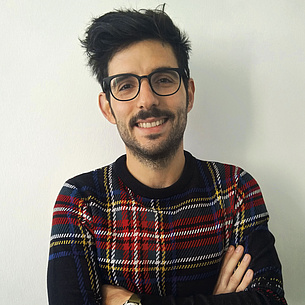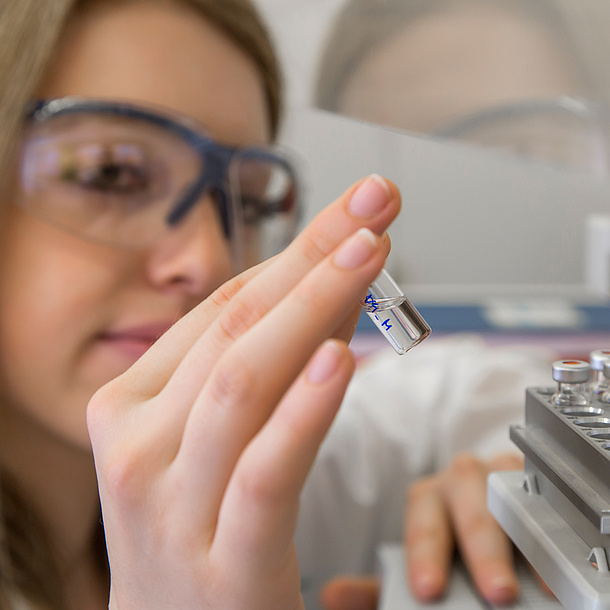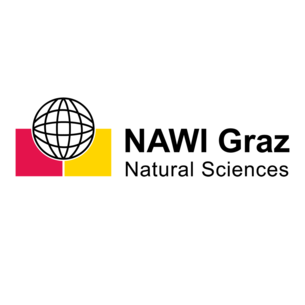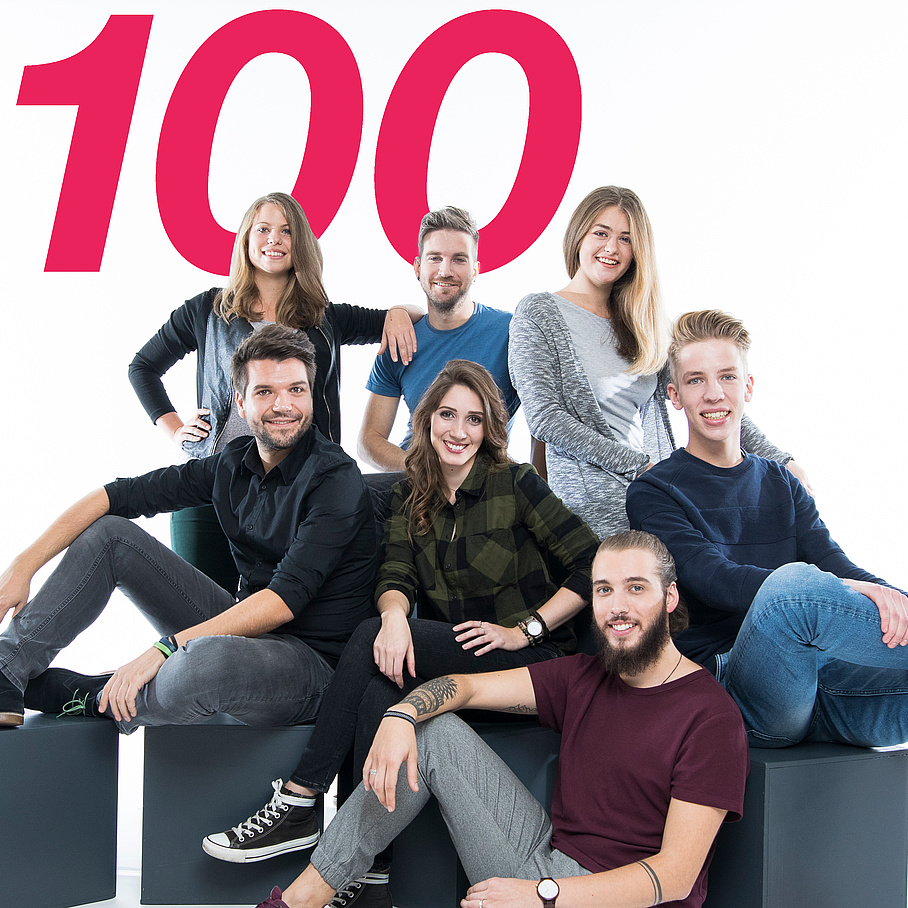Quick Facts
- Duration of study: 4 semesters
- ECTS credit points: 120
- Academic degree:
Diplom-Ingenieurin
orDiplom-Ingenieur
(Dipl.Ing. or DI), equivalent to the Master of Science (MSc) - Language of instruction: English
The Master's Programme
The master's degree programme Chemical and Pharmaceutical Engineering
builds on a bachelor's degree programme in fields such as chemistry, technical chemistry, or pharmacy. In this application-based degree programme, you will learn the fundamentals of engineering that are required to apply chemical or pharmaceutical processes on an industrial scale and learn how to transfer laboratory results to pharmaceutical and chemical production.
In practical exercises, process simulations are carried out and the methods used to produce pharmaceuticals in practice are shown. The laboratories are equipped with state-of-the-art metrological equipment, such as Optical Coherence Tomography/Near-infrared (OCT/NIR) equipment which enables product quality to be checked online.
The use of a wide range of laboratory facilities – from those used in the natural sciences to those used in the engineering sciences – represents a unique feature of this programme. For example, students can use the laboratory equipment at the RCPE Competence Centre, the infrastructure of the Institute of Pharmaceutical Sciences (laboratory equipment for the production of pharmaceutical preparations) and the pilot plants of the Institute of Chemical Engineering and Environmental Technology (pilot plants for process separation processes), while conducting internships or their master's theses.

The master provides the necessary knowledge for a natural scientist to pursue a process engineering career in industry and research. Depending on the specialization chosen, process engineering can be further studied from a chemical or a pharmaceutical point of view. I chose the Chemical Engineering specialization, where we studied in theory and practice notable and innovative processes in the industry such as thermal separations and particle engineering.
Focus Areas
You can deepen your knowledge in the following areas of specialisation:
Pharmaceutical Engineering: You acquire knowledge of pharmaceutical product and process technology and learn how to develop pharmaceutical products more rapidly and reduce production costs. You learn, for example, how to address aspects of process engineering in the production of pharmaceuticals, plant engineering, or biotechnology.
Chemical Engineering: You learn how to carry out interdisciplinary work, bridging the gap between the disciplines of chemistry and process engineering. You gain expertise in product and process design. As one example, you learn how to use renewable resources in the chemical industry in economically sensible and sustainable ways.
Collaborations and Networks
The master's programme is offered jointly by TU Graz and the University of Graz, as part of NAWI Graz. This allows students to benefit from the expertise at two universities. Close cooperation exists with the Institute of Pharmaceutical Sciences in the field of Pharmaceutical Technology & Biopharmacy, as well as with the Institute of Chemistry at the University of Graz. Furthermore, a close connection has been established with the RCPE Competence Centre (Research Center for Pharmaceutical Engineering). Thus, courses are jointly designed and held by TU Graz, the University of Graz and the RCPE. Lecturers from industry also give insights into everyday R&D, providing a chemical and pharmaceutical industrial perspective.
Cooperation projects with the chemical and pharmaceutical industry or the RCPE are made possible in project laboratories and through master thesis work. In addition, students have the opportunity to work on one of the numerous research projects hosted at the institutes and research centres at TU Graz and the University of Graz involved in this master's degree programme. The close cooperation with international research institutes and universities in the field of the master's degree programme also enables students to spend exciting and rewarding periods of time abroad. Furthermore, students can participate free of charge in international conferences that are organised by the study programme sponsors. Excursions (e.g. to Achema or to various company locations) are also offered on a regular basis.
Admission
The prerequisite for admission is a completed bachelor’s degree in a relevant subject (see curriculum).
Additionally, you need to provide evidence of competence in the English language.
1. Admission Procedure
Admission without admission procedure
Graduates of the bachelor's degree programme Chemistry offered at TU Graz or University of Graz and graduates of the Diplomstudium Pharmazie
offered at University of Graz will be accepted without an admission procedure.
Graduates of all other degree programmes offered at the TU Graz or, in the case of a NAWI Graz programme, the University of Graz can apply for admission at the Registrar's Office without an admission procedure.
Admission with admission procedure
Graduates of a previous study programme not mentioned above undergo an admission procedure.
Registration for the academic year 2026/27: 15 October to 15 December 2025
You can complete the admission procedure before the end of your bachelor’s studies.
Please do not send any documents by post!
2. Admission
- Admission and deadlines for international students
- Admission and deadlines for Austrian students who are registering to study at TU Graz for the first time
If you have already been admitted to a degree programme at TU Graz, or have studied at TU Graz before, please come to the Registrar's Office in person to complete your admission during the admission period.
Fragen zur Zulassung?
Contact study@tugraz.at
Career Prospects

As a chemist, completing the master's degree programme enabled me to gain a perspective outside the four laboratory walls and develop an understanding of how to develop an industrial process beginning from a single laboratory batch. With my broad knowledge of chemistry, which ranges from process engineering to the final pharmaceutical product, I feel prepared to pursue a career in experimental research or industry.
The theoretical and practical teaching content of the programme forms the ideal basis for the development of new technologies. Because I had an idea about the capsule reactor, I was allowed to participate in the Falling Walls Lab Finale, an international ideas competition, in Berlin.
Professional Fields
Graduates who specialise in Chemical Engineering work in the chemical and petrochemical industry, e.g.
- in research,
- product and process development,
- plant design and production.
You address all aspects of the plant planning and operation, such as economic efficiency, ecology and safety engineering.
Graduates who specialise in Pharmaceutical Engineering work in the pharmaceutical and biopharmaceutical industry and represent a link between drug development and production. They are involved, for example
- with pharmaceutical process development,
- quality assurance in production areas and
- the introduction of new production processes.
In chemical and pharmaceutical research, they develop new methods for drug production and work on topics such as nanotechnology and process simulation.

Most fascinating is the interdisciplinarity of the lectures and laboratory exercises. Courses are held by experts in the fields of chemical engineering, pharmaceutical technology, and biopharmaceutics.
Close collaboration with research institutes assure students access to state-of-the-art equipment and interesting thesis topics. Graduates can pursue a career in the chemical industry, food industry, pharmaceutical industry, research organizations, or universities. I am currently employed at RCPE, where I am working on projects in the field of formulation development for pharmaceutical products.




